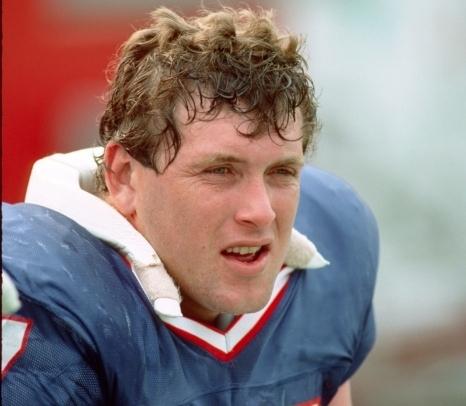
Former owner of Winona truck stop
GREENWOOD – James Kent Hull, one of the best players in the Buffalo Bills’ Super Bowl era and one of the strongest leaders the team has ever has seen, died suddenly on Tuesday, Oct. 18, at his home in Greenwood. Hull was 50 years old.
According to printed sources, Hull died of intestinal bleeding due to a prolonged battle with chronic liver disease.
Funeral services were held Friday, Oct. 21 at First Presbyterian Church in Greenwood. Hull is survived by his wife, Kay, and two children, Drew and Ellen.
As a boy growing up in the delta town of Greenwood, Hull didn’t hunger for the NFL; basketball was his first passion, media reports said. Although he starred in both sports in high school, football eventually won out as his tall frame began to fill out.
Hull was the starting center at Mississippi State for four seasons and parlayed an outstanding college career into selection as a seventh round pick of the New Jersey Generals of the United States Football League in 1983.
At Mississippi State, Hull was part of one of the Bulldogs’ most memorable games, when they pulled out a 6-3 victory over top-ranked Alabama in 1980. Hull played a critical role in the Bulldogs’ option attack which set numerous school records for yards rushing and total offense, some of which still stand today.
Hull didn’t anticipate an NFL career when the USFL folded after three seasons, but he also never anticipated the injury to center Tim Vogler which created an opportunity for an experienced center with the Buffalo Bills.
The Bills signed Hull in August 1986, on the same day that Jim Kelly became a Bill.
Kelly described Hull as a “man of great courage and character,” in a statement released by the Bills following Hull’s death.
“Words fall short when the pain runs so deep,” Kelly said. “I’m finding it hard to describe what this loss means to me and my family. Kent Hull was my best friend. … He will be missed and never forgotten.”
Hull’s versatility was the key to his success, and to his NFL longevity.
The Bills ran a traditional offense upon Kelly’s arrival and ran it well enough to win division titles in 1988 and 1989. Hull’s contributions to those teams were recognized by selection to the Pro-Bowl squad in 1989. However, the birth of the no-huddle offense in 1990 not only changed the team’s offensive philosophy, but placed new demands and responsibilities on its center. Hull not only adapted, but flourished, gaining Pro-Bowl status in 1990 and 1991 as the Bills won their first two American Football Conference Championships.
The complexity of any center’s job is often unappreciated by fans, but this was particularly true in Hull’s situation, the Associated Press reported. The no-huddle offense is severely physically demanding and forces a center to read defenses and react quickly.
The Bills’ wide-open offense also required Hull to block opposing nose tackles one-on-one. Hull’s teammates appreciated the key role he played as the hub of the offense, however, and his coaches considered him among the best ever to play the game at his position.
Hull was tough and durable as a player, and at one point appeared in 121 consecutive games with the Bills. He appeared in 189 games in all with Buffalo.
Hull’s contract expired after the Bills’ disappointing 1994 season, but he eschewed potential riches elsewhere to stay with the Bills for two additional seasons.
His loyalty was rewarded by two more trips to the playoffs in 1995 and 1996.
In 1997, Hull’s years of tireless, quiet service to his team were recognized by the community as he joined teammate Jim Kelly as the first members of the Bills’ Super Bowl teams inducted into the Greater Buffalo Sports Hall of Fame.
Hull also joined Kelly in announcing his retirement following the 1996 season.
When his playing days were over, Hull remained busy working his 2,500 acre cattle farm in northeastern Greenwood.
Hull also owned the High Point Truck and Travel Stop in Winona, Miss., which was later sold to Pilot Travel Centers in 2005, in a multi-million dollar deal.
Hull sponsored an annual celebrity golf tournament every summer to raise money for the Blair E. Batson Hospital for Children in Jackson, Miss.
Hull’s sudden death last week left his former teammates, Hall of Fame coach Marv Levy and even their respective families inconsolable.
“I’m so, deeply saddened,” Levy said. “I coached for 47 years, and he honestly was one of the very most memorable individuals who was my privilege to coach. He was an enjoyable man to be around. He made life so pleasant for his teammates, or who ever he was with,” Levy said further. “He represented everything that sports should be.”
“Not only was he a great competitor and a great player, he was one of my best friends,” Jim Kelly said. “He’s a guy that if I ever wind up having a boy, I’d hope he grow up to be just like Kent Hull. He’s a family guy and a person I love very much. I’m going to miss him.”
“We have suffered a tremendous loss,” Bills Hall of Fame running back Thurman Thomas wrote in an email to The Associated Press. “Kent was a teammate, big brother and best friend. My heart breaks for His amazing family. My heart breaks period. He will be a best friend and in my heart forever.”


Be the first to comment